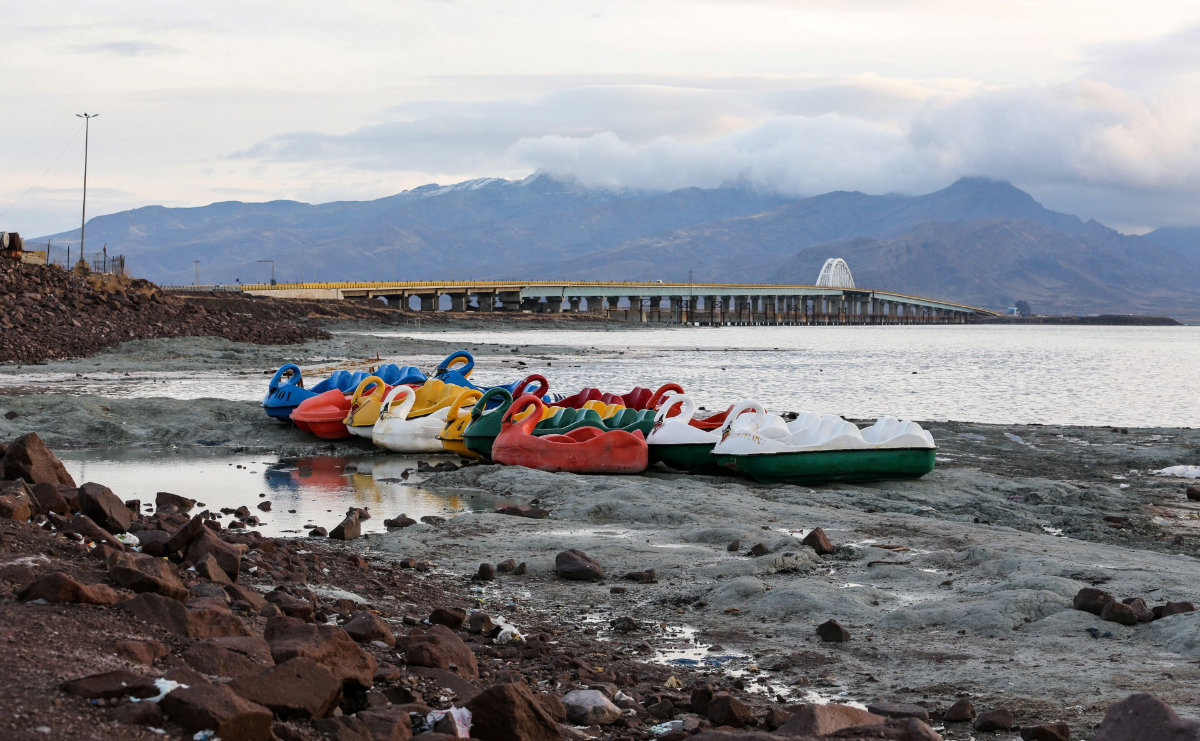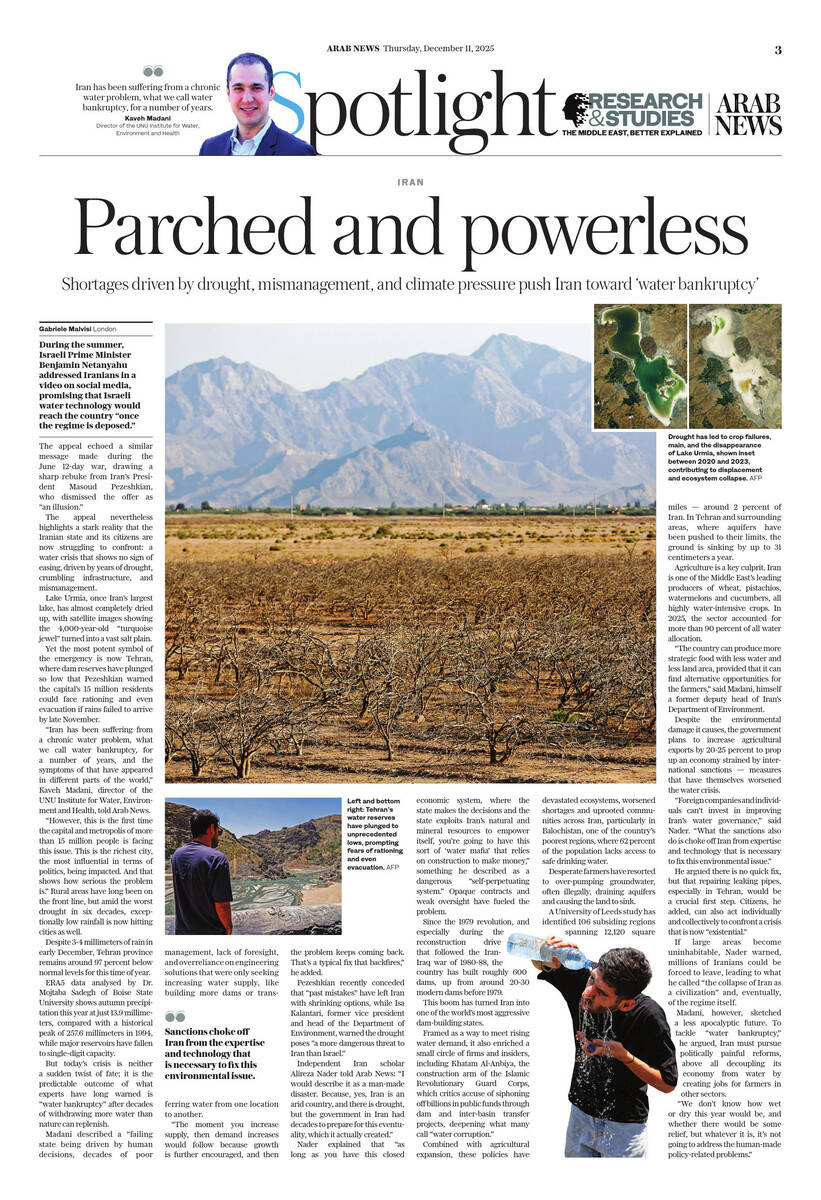JERUSALEM: A strike in Gaza killed several members of a family Friday as Israel ordered ground forces to advance deeper into the territory and vowed to hold more land until Hamas releases its remaining hostages.
The explosion east of Gaza City killed a couple and their two children, plus two additional children who weren’t related to them but were in the same building, according to witnesses and a local hospital. The Israeli army said it struck a militant in a Gaza City building and took steps to minimize civilian harm. It was not immediately clear if the army was referring to the same strike.
The Israeli military said on social media it was planning to conduct raids in three neighborhoods west of Gaza City, and it warned Palestinians to evacuate the area in advance. The warning came shortly after the Israeli military said it intercepted two rockets fired from northern Gaza that set off sirens in the Israeli coastal city of Ashkelon.
After retaking part of a corridor that divides Gaza’s north from south, Israeli troops moved Thursday toward the northern town of Beit Lahiya and the southern border city of Rafah. The military said it had resumed enforcing a blockade on northern Gaza, including Gaza City.
Defense Minister Israel Katz said Friday that Israel would carry out operations in Gaza “with increasing intensity until the hostages are released by Hamas.”
He continued: “I ordered the army to seize more territory in Gaza ... the more Hamas refuses to free the hostages, the more territory it will lose, which will be annexed by Israel.”
He also threatened “to expand buffer zones around Gaza ... by implementing a permanent Israeli occupation of the area.”
In Israel, Prime Minister Benjamin Netanyahu was delivered a setback in his attempt to fire the country’s domestic security chief.
Hours after Netanyahu’s Cabinet unanimously approved the firing Ronen Bar, head of the Shin Bet security service, the Supreme Court ordered a temporary halt to his dismissal until an appeal can be heard no later than April 8. Netanyahu’s office had said Bar’s dismissal was effective April 10, but that it could come earlier if a replacement was found.
Israel’s attorney general has ruled that the Cabinet has no legal basis to dismiss Bar.
Opinion
This section contains relevant reference points, placed in (Opinion field)
A Shin Bet report into Hamas’ Oct. 7, 2023, attack that prompted the war in Gaza acknowledged failures by the security agency. But it also said policies by Netanyahu’s government created the conditions for the attack.
Netanyahu has resisted calls for an official state commission of inquiry into the Oct. 7 attack and has tried to blame the failures on the army and security agencies.
A number of senior security officials, including a defense minister and army chief, have been fired or forced to step down. Bar had been one of the few senior security officials since the Oct. 7 attack to remain in office.
The decision to sack Bar deepens a power struggle focused largely over who bears responsibility for the 2023 Hamas attack. It also could set the stage for a crisis over the country’s division of powers.
Critics say the move is a power grab by the prime minister against an independent-minded civil servant, and tens of thousands of Israelis have demonstrated in support of Bar, including outside Netanyahu’s residence on Friday.
Netanyahu sounded defiant in a social media post Friday evening, saying: “The State of Israel is a state of law and according to the law, the Israeli government decides who will be the head of the Shin Bet.”
Hundreds dead in Gaza since ceasefire collapsed
Nearly 600 Palestinians have been killed since Israel on Tuesday shattered a truce that had facilitated the release of more than two dozen hostages and brought relative calm since late January.
In the southern city of Rafah, officials said Israeli bombardments had forced residents into the open, deepening their suffering. Officials said they halted the building of shelter camps to protect employees.
Israel had already cut off the supply of food, fuel and humanitarian aid to Gaza’s roughly 2 million Palestinians. It says military operations will escalate until Hamas releases the 59 hostages it holds — 24 of whom are believed alive — and gives up control of the territory.
The ceasefire agreed to in mid-January was a three-phase plan meant to lead to a long-term cessation of hostilities, a full Israeli withdrawal from Gaza, and the return of all hostages taken by Hamas.
In the first phase of the ceasefire, Hamas returned 25 living hostages and the remains of eight others in exchange for the release of nearly 1,800 Palestinian prisoners. Israeli forces also withdrew to buffer zones inside Gaza, and hundreds of thousands of displaced Palestinians returned to northern Gaza.
The ceasefire was supposed to last as long as talks on the second phase continued but Netanyahu balked at entering substantive negotiations.
Instead, he tried to force Hamas to accept a new ceasefire plan put forth by US Mideast envoy Steve Witkoff.
That plan would have required Hamas to release half its remaining hostages — the militant group’s main bargaining chip — in exchange for a ceasefire extension and a promise to negotiate a lasting truce. Israel made no mention of releasing more Palestinian prisoners — a key component of the first phase.
Hamas says it will only release the remaining hostages in exchange for a lasting ceasefire and a full Israeli withdrawal from Gaza, as called for in the original ceasefire agreement mediated by the United States, Egypt and Qatar.
The militant group has said it is willing to hand over power to the Western-backed Palestinian Authority or a committee of political independents but will not lay down its arms until Israel ends its decades-long occupation of lands the Palestinians want for a future state.
Hamas accuses Netanyahu of stalling negotiations
Hamas said in a statement Friday that the firing of Shin Bet’s head shows a “deepening crisis of distrust” within Israel’s leadership. It also said Netanyahu used the ceasefire negotiations “to stall and buy time without any genuine intention of reaching tangible outcomes.”
Netanyahu said he had ordered the resumed strikes on Gaza this week because of Hamas’ rejection of the new proposal.
The war began when Hamas-led militants stormed into southern Israel on Oct. 7, 2023, killing some 1,200 people and taking 251 hostage. Most of the hostages have been freed in ceasefire agreements or other deals. Israeli forces have rescued eight living hostages and recovered the bodies of dozens more.
Israel’s retaliatory offensive has killed more than 49,000 Palestinians, according to the Gaza Health Ministry. It does not say how many were militants, but says more than half of those killed were women and children. Israel says it has killed around 20,000 militants, without providing evidence.
The war at its height displaced around 90 percent of Gaza’s population and has caused vast destruction across the territory.

















